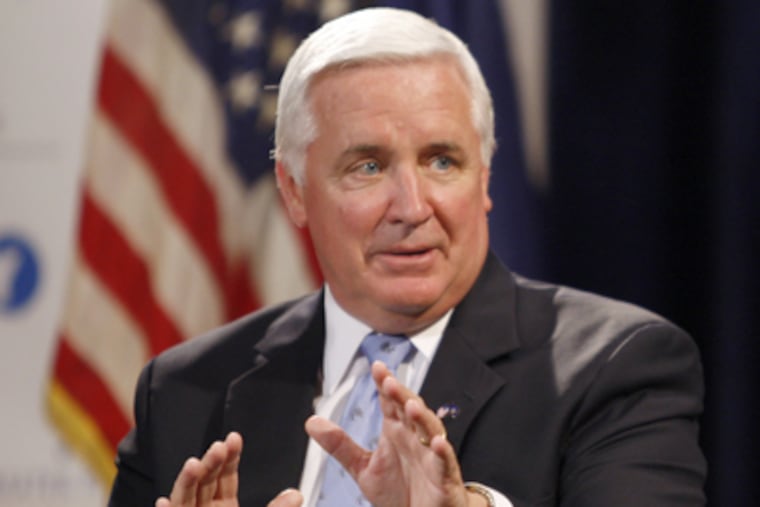Inquirer Editorial: Drilling down into fee details
Not a moment too soon, Gov. Corbett and Republican legislative leaders finally are facing up to the task of making Pennsylvania's natural-gas drillers pay more toward their fair share.

Not a moment too soon, Gov. Corbett and Republican legislative leaders finally are facing up to the task of making Pennsylvania's natural-gas drillers pay more toward their fair share.
With a second round of state spending cuts expected Tuesday in Corbett's annual budget address, it would look worse than ever had the state remained the only major gas-producing state without a tax on gas drilling.
So, it represents progress even by Harrisburg's minimal standards that lawmakers report broad agreement on a plan to impose an impact fee that could raise up to $355,000 per well over a 15-year period.
Hold the applause, however.
The levy could bring in considerably less, since it will be pegged to natural-gas prices already on a downward slide. Even at full throttle, the fee would be among the nation's lowest - bringing in easily less than half what per-well taxes yield in West Virginia and Texas, for instance.
On key environmental concerns, the plan also appears to favor drillers. Even though the chemical-laced hydraulic fracturing drilling process poses a potential threat to drinking water supplies, and the noise and other congestion from drilling ought to be regulated as with other industries, the state would allow drillers to sidestep local planning rules with an appeal to Harrisburg. That provision caused a mini-revolt in GOP ranks, but Corbett appears to have held fast to the spurious notion that, without special handling, drillers will pull their rigs out of the state's rich Marcellus Shale formation.
To its credit, the impact-fee deal would put needed funds into the pipeline for greenways, trails, open space, and statewide beautification projects. Environmental groups, though, say those funds are back-loaded - and fear they may fall well short.
In the two-dozen counties with active drilling, stretching in an arc from Pittsburgh to along the New York border, at least the impact fee would provide revenue to help meet deferred infrastructure and public-safety costs.
Yet even those revenues could prove illusive, since this jury-rigged plan requires that each county first authorize the fee before it can be collected. That may enable Corbett and GOP lawmakers to cling to their unworkable no-new-taxes pledge, but it's no way to set policy for the benefit of the entire state.
What the impact-fee plan mostly represents, then, is a missed opportunity to enact a "fair and robust tax" on drilling, as the environmental group PennFuture urged on Monday and as proposed a full three years ago by then-Gov. Edward G. Rendell.
At least, the fee deal is preferable to letting drillers enjoy a free ride on a gas-production tax - while average Pennsylvanians brace for more budget cuts and local tax increases.